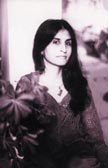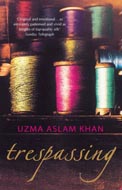| Dia sat in the mulberry tree her father had sheltered in the night before his death. A large man, he’d been limber too. Squatting had come easy. The crowd below had included journalists, neighbors and police. They’d asked if it were true: was he getting death threats?
Her father weighed ninety kilos and hunkered like a gentle ape, shuffling about in the foliage, appraising his audience with two small brown eyes that flashed like rockets. Every
few minutes, he mustered up enough nerve to shake some berries. When they struck a particularly distasteful newsman or auntie, he slapped a knee with glee. Then he wept unabashedly.
The tree had been planted the day Dia was born. Her father had said the sweet, dainty, purplish-red fruit was like his precious daughter when she slid howling into the world. So when he tossed the berries at the throng, Dia, watching from inside the house, knew he was calling her. But her mother insisted she stay inside.
‘He’s gone mad,’ she whispered, clutching Dia. ‘I shouldn’t have told him.’
Told him what? Dia wondered.
Today, up in the tree, a book of fables pressed heavily in her lap. The weight was partly psychological. She should have
been studying. She’d failed an exam and ought to be preparing
for the retake. Instead she flipped through the book’s pages,
where lay miscellaneous clippings about history and bugs.
She found a page ripped from a Gymkhana library book and
read it aloud:
‘Silk was discovered in China more than four thousand years
ago, purely by accident. For many months Emperor Huang-ti
had noticed the mulberry bushes in his luscious garden steadily
losing their leaves. His bride, Hsi-Ling-Shih, was asked to
investigate. She noticed little insects crawling about the bushes, and found several small, white pellets. Taking a pellet with her
to the palace, with nothing but instinct she ventured on the best
place to put it: in a tub of boiling water. Almost at once, a mesh
of curious fine thread separated itself from the soft ball. The
Empress gently pulled the thread. It was half a mile long. She
wove it into a royal robe for her husband, the first silk item in history. Since then, sericulture has remained a woman’s job, in particular, an empress’.’
Dia tucked the stolen page back into her book. The best
episodes from history were of discovery. She liked to slow the
clock at the moment before the Empress thought to drop the
cocoon into the water—just before she metamorphosed into a
pioneer. What had moved her not to simply crush the little
menaces, as most people disposed of pests today? How relaxed
and curious her intellect had been, and how liberally she’d been
rewarded!
The setting fired Dia’s imagination too. It would be an arbor at the top of a hillock, with plenty of sunlight, a long stone table, basins, and attendants ready with towels and disinfectants. When they’d made a circle around the Empress, Dia commanded the minute hand to shift. The Empress dropped a cocoon into
the water.
It shriveled and expelled its last breath: a tangle of filament the Empress hastened to twist around her arm like candy-floss on a stick. The attendants gawked. Their mistress was sweating. The wind was soft. The sun snagged in the strand, a blinding prism growing on the arm of the Empress, as if she spun sunlight. When the sun went down she’d cooked all the cocoons from the imperial garden. Miles of thread hung in coils around both her arms. The attendants dabbed at her brow and helped her down the hill, back to the palace. The Emperor called for her all night. But she couldn’t sleep beside him with arms encased so. The maids burned oil lamps, dias, and she sat up alone, occasionally looking out at the moon and down at the mulberry trees, making a robe for her husband that by morning would reflect the rays of the sun, and by next evening, the moon.
Dia smiled contentedly. Now she’d play What If, and retell
the story.
|
 |
UZMA ASLAM KHAN was born in Lahore, and grew up in Karachi. Her first novel, The Story of Noble Rot, was published by Penguin India in 2001. Trespassing, her second novel was published in 2003 by Flamingo / Harper Collins UK in 2003, has been translated into 13 languages, and was nominated for the 2003 Commonwealth Writers Prize (Eurasia). She lives in Lahore, where she is currently at work on a third novel.
|


